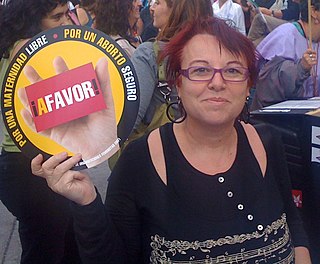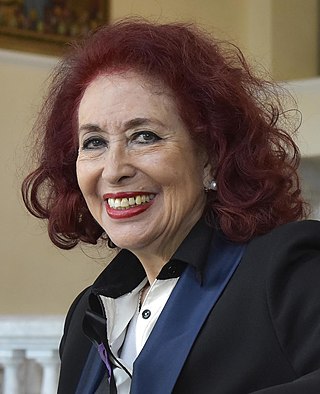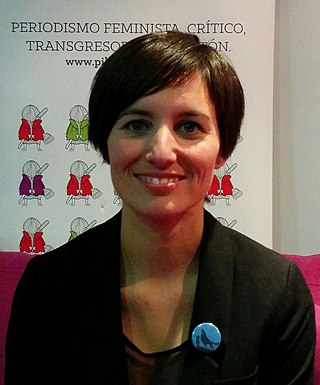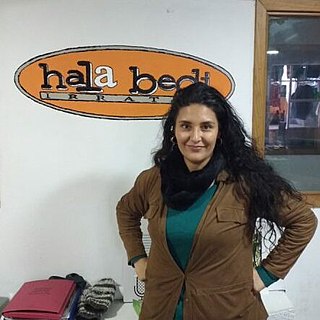
Feminist language reform has proposed gender neutrality in languages with grammatical gender, such as Spanish. Grammatical gender in Spanish refers to how Spanish nouns are categorized as either masculine or feminine. As in other Romance languages—such as Portuguese, to which Spanish is very similar—a group of both men and women, or someone of unknown gender, is usually referred to by the masculine form of a noun and/or pronoun. Advocates of gender-neutral language modification consider this to be sexist, and exclusive of gender non-conforming people. They also stress the underlying sexism of words whose feminine form has a different, often less prestigious meaning. Some argue that a gender neutral Spanish can reduce gender stereotyping, deconstructing sexist gender roles and discrimination in the workplace.

Rosa Inés Curiel Pichardo, better known as Ochy Curiel, is an Afro-Dominican feminist academic, singer and social anthropologist. She is known for helping to establish the Afro-Caribbean women's movement and maintaining that lesbianism is neither an identity, orientation nor sexual preference, but rather a political position. She is one of the most prominent feminist scholars in Latin America and the Caribbean.

Celia Amorós Puente is a Spanish philosopher, essayist and supporter of feminist theory. She is a key figure in the so-called equality feminism and focused an important part of her research in the building of relations between Enlightenment and feminism. Her book Hacia una crítica de la razón patriarcal constitutes a new outlook on the gender perspective of philosophy, revealing the biases of androcentrism and claims a critical review on behalf of women.
Silvia Berger works at the Ministry of Economics and Production in Argentina, Latin American Council of Social Sciences (CLACSO), and is a post-graduate university teacher at the Latin American Social Sciences Institute. and past president of the International Association for Feminist Economics (IAFFE), her tenure was from 2017 to 2018. 7 Berger is a member of the editorial committee for the Mexican journal Ola Financiera.
Magaly Antonia Pineda Tejada, known as the mother of feminism in the Dominican Republic, was a Dominican sociologist, teacher, researcher, and activist. She was considered one of the most important defenders of human rights, particularly women's rights, in her country. As a leftist activist, she participated in the 14th of June Revolutionary Movement and the Dominican Popular Movement.

Mónica Tarducci is an Argentine anthropologist and feminist activist. Her research focuses on the intersections of gender and religion, and on the adoption of children in the province of Misiones. Tarducci currently teaches at the Universidad de Buenos Aires and at the Universidad Nacional de San Martín.

María Cambrils Sendra was a Spanish writer and feminist. She was self-taught and became part of the working class intellectual elite as a writer and lecturer. She published numerous articles in the workers' press, especially El Socialista. She is the author of the 1925 book Feminismo socialista, a reference on women's rights and feminist and socialist action.

Purplewashing is a term used to describe the practice of using feminist or LGBTQ+ issues to mask discriminatory or harmful practices. It involves selectively promoting certain aspects of feminism or LGBTQ+ rights to improve a company's or organization's image, while often neglecting or undermining these same issues in other contexts.

Montserrat Boix Piqué is a Spanish journalist, considered among the most influential women in her country. In early 2000, she created and developed the concepts of social cyberfeminism, and a year later those of feminist hacktivism. Another of her main areas of work is gender violence and communication. She has also stood out as a defender of the right to communication and citizenship rights for women. Since 1986, she has been a journalist for the Information Services of Televisión Española (TVE), in the international section.

Ana de Miguel Álvarez is a Spanish philosopher and feminist. Since 2005 she has been a titular professor of Moral and Political Philosophy at King Juan Carlos University of Madrid. She directs the course History of Feminist Theory at the Complutense University of Madrid's Instituto de Investigaciones Feministas.

Alicia Helda Puleo García is an Argentine-born feminist philosopher based in Spain. She is known for the development of ecofeminist thinking. Among her main publications is Ecofeminismo para otro mundo posible.

Rosa Cobo Bedía is a Spanish feminist, writer, and professor of sociology of gender at the University of A Coruña. She is also the director of the Center for Gender Studies and Feminists at the same university. Her main line of research is feminist theory and the sociology of gender.

Lidia Falcón O'Neill is a Spanish politician and writer. With a degree in law, dramatic art, and journalism, and a PhD in philosophy, she has stood out for her defense of feminism in Spain, especially during the Transition.

Romani feminism or Gypsy feminism is the feminist trend that promotes gender equality, the fight against social inequalities and the defense of the integration of women in different movements in society, making these processes compatible with the preservation of culture and values of the Romani people.

June Fernández Casete is a Spanish journalist. She is a co-founder and the director of the feminist Pikara Magazine.

Cotidiano Mujer was a Uruguayan magazine published by the feminist collective of the same name from 1985 to 2013. Its objectives were to discuss human rights and women's rights, and to give visibility to aspects of the daily lives of women.

Teresa Meana Suárez is a Spanish feminist activist, teacher, and philologist specializing in inclusive and non-sexist language. She has published numerous articles on the issue of language discrimination against women, specifically, in Spanish.

Silvia Agüero is a Spanish Roma feminist writer and human rights activist who recovers the memory of the oppression of gitano people.
Lorena Cabnal is co-founder of the community-territorial feminist movement in Guatemala and of the Red de Sanadoras Ancestrales del Feminismo Comunitario.

Purple capitalism or feminist capitalism is a term used to describe, from a critical perspective, the incorporation of some principles of the feminist movement into capitalism and the market economy.

















